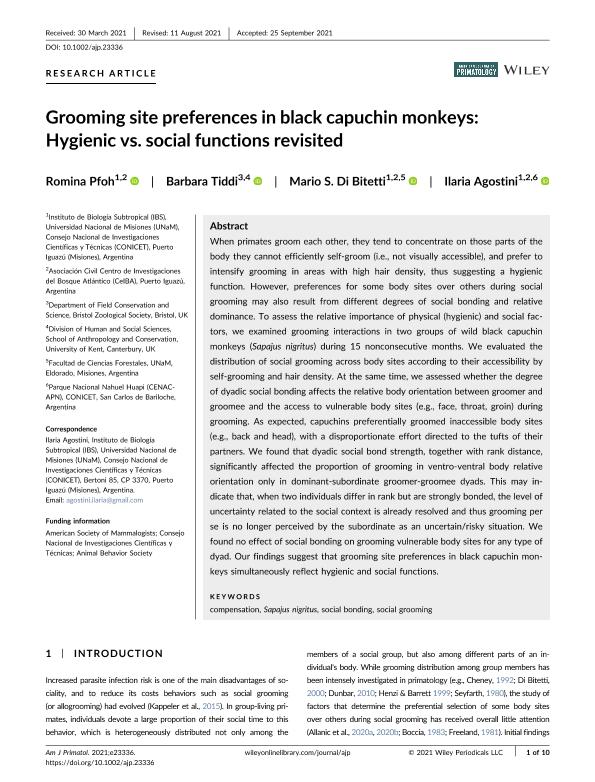Artículo
Grooming site preferences in black capuchin monkeys: Hygienic vs. social functions revisited
Fecha de publicación:
10/2021
Editorial:
Wiley-liss, div John Wiley & Sons Inc.
Revista:
American Journal Of Primatology
ISSN:
0275-2565
Idioma:
Inglés
Tipo de recurso:
Artículo publicado
Clasificación temática:
Resumen
When primates groom each other, they tend to concentrate on those parts of the body they cannot efficiently self-groom (i.e., not visually accessible), and prefer to intensify grooming in areas with high hair density, thus suggesting a hygienic function. However, preferences for some body sites over others during social grooming may also result from different degrees of social bonding and relative dominance. To assess the relative importance of physical (hygienic) and social factors, we examined grooming interactions in two groups of wild black capuchin monkeys (Sapajus nigritus) during 15 nonconsecutive months. We evaluated the distribution of social grooming across body sites according to their accessibility by self-grooming and hair density. At the same time, we assessed whether the degree of dyadic social bonding affects the relative body orientation between groomer and groomee and the access to vulnerable body sites (e.g., face, throat, groin) during grooming. As expected, capuchins preferentially groomed inaccessible body sites (e.g., back and head), with a disproportionate effort directed to the tufts of their partners. We found that dyadic social bond strength, together with rank distance, significantly affected the proportion of grooming in ventro-ventral body relative orientation only in dominant-subordinate groomer-groomee dyads. This may indicate that, when two individuals differ in rank but are strongly bonded, the level of uncertainty related to the social context is already resolved and thus grooming per se is no longer perceived by the subordinate as an uncertain/risky situation. We found no effect of social bonding on grooming vulnerable body sites for any type of dyad. Our findings suggest that grooming site preferences in black capuchin monkeys simultaneously reflect hygienic and social functions.
Palabras clave:
COMPENSATION
,
SAPAJUS NIGRITUS
,
SOCIAL BONDING
,
SOCIAL GROOMING
Archivos asociados
Licencia
Identificadores
Colecciones
Articulos(CCT - PATAGONIA NORTE)
Articulos de CTRO.CIENTIFICO TECNOL.CONICET - PATAGONIA NORTE
Articulos de CTRO.CIENTIFICO TECNOL.CONICET - PATAGONIA NORTE
Articulos(IBS)
Articulos de INSTITUTO DE BIOLOGIA SUBTROPICAL
Articulos de INSTITUTO DE BIOLOGIA SUBTROPICAL
Citación
Pfoh, Romina Vanesa; Tiddi, Barbara; Di Bitetti, Mario Santiago; Agostini, Ilaria; Grooming site preferences in black capuchin monkeys: Hygienic vs. social functions revisited; Wiley-liss, div John Wiley & Sons Inc.; American Journal Of Primatology; 83; 12; 10-2021; 1-10
Compartir
Altmétricas




